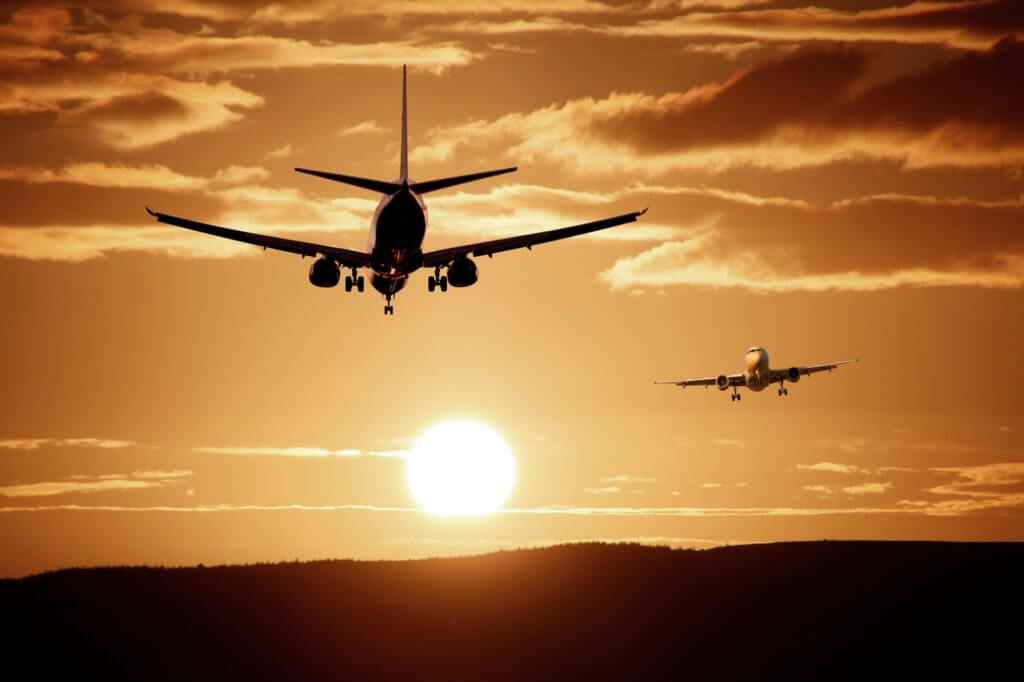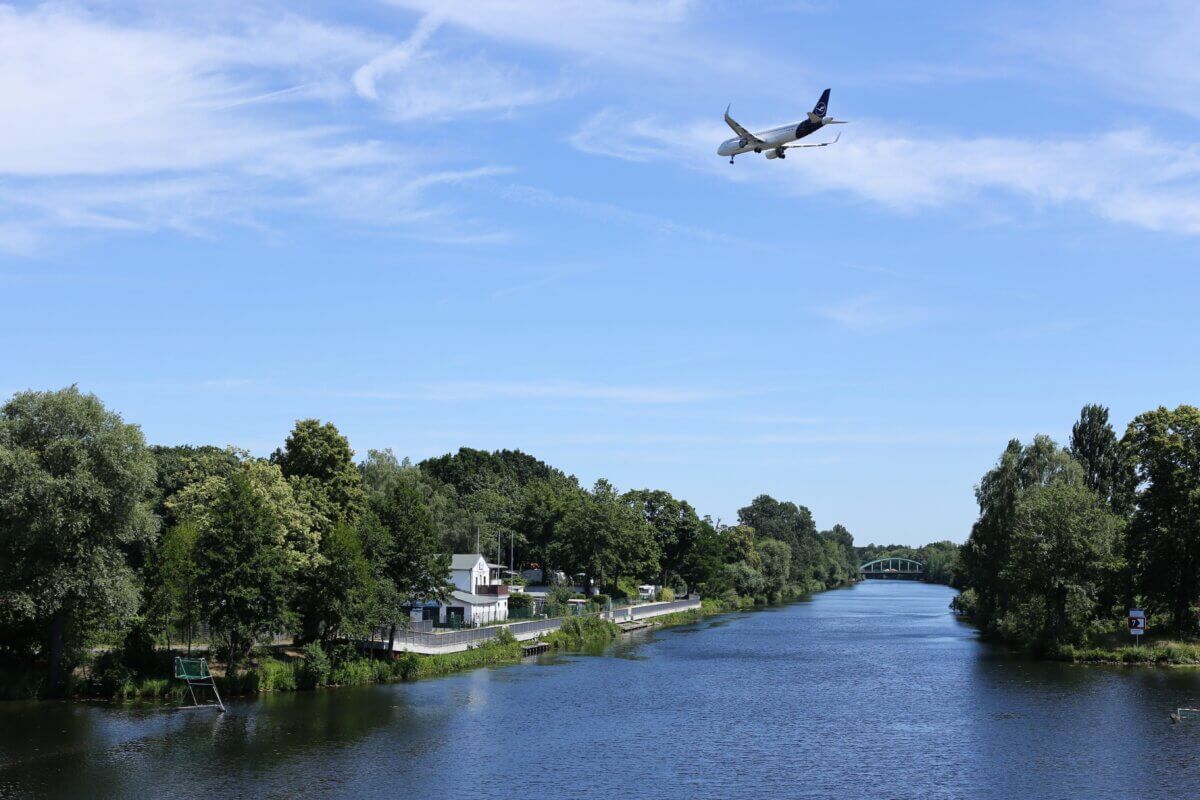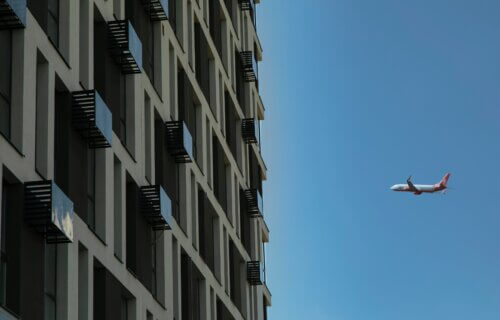BOSTON — Catching some decent shuteye aboard an airplane is notoriously difficult, but fascinating new findings report simply hearing aircraft noise up in the sky or at a nearby airport can lead to sleep issues as well. People who hear even moderate levels of aircraft noise were less likely to attain the minimum recommended amount of sleep each night — about seven hours.
Interestingly, this risk tended to increase among people living in the Western United States, near a major cargo airport, or near a large body of water. It also affected people with no history of hearing loss.
This new report, conducted by the Boston University School of Public Health (BUSPH) and Oregon State University researchers, concludes exposure to moderate levels of airplane noise may disrupt normal sleep patterns. These findings build on an already sizable portion of research examining the adverse health effects of environmental noise.
More specifically, researchers say those dealing with airplane noise at levels as low as 45 decibels (dB) were more likely to sleep fewer than seven hours nightly. For comparison’s sake, the sound of a whisper is 30 dB, a library usually sits at 40 dB, and a typical conversation at home is usually about 50 dB.
Scroll down to see 8 ways to keep things quiet while you sleep

Why is sleep so important for your health?
Getting enough sleep on a regular basis, of course, is absolutely essential to proper health and well-being, including daily physical and mental functioning. Consistent lack of sleep can lead to numerous health issues like increased risks of cardiovascular disease, depression, diabetes, cancer, and more. Generally speaking, health experts agree the average adult needs somewhere between seven to nine hours of sleep on a daily basis for healthy functioning.
This project was the first ever large-scale analysis of aircraft noise and sleep duration that also accounted for the disruptive effects of multiple environmental exposures in communities, like greenery and light at night (LAN).
According to study lead author Matthew Bozigar, assistant professor of epidemiology at OSU, and study senior author Junenette Peters, associate professor of environmental health at BUSPH, while exposure to aircraft noise is quite common, very have been few established facts regarding the health effects of aircraft noise, particularly in the United States.
“This study helps us understand the potential health pathways by which aircraft noise may act, such as through disrupted sleep,” Peters says in a university release.
What’s the official limit on airplane noise?
To conduct this research, study authors examined airplane noise exposure and self-reported sleep disturbance data pertaining to over 35,000 participants living around 90 major U.S. airports. The team selected the participants from the Nurses’ Health Study (NHS), an ongoing, prospective study of U.S. female nurses who have been completing biennial questionnaires since 1976.
Researchers examined aircraft noise levels every five years from 1995 to 2015, with a particular focus on two measurements: a nighttime estimate (Lnight) capturing airplane noise occurring while people sleep, and a day-night estimate (DNL) that captured the average noise level over a 24-hour period. They applied a 10-dB adjustment for aircraft noise occurring at night, when background noise is low. The FAA actually uses the DNL as its primary metric for aircraft noise policies, and the threshold for significant noise impacts is just above DNL 65 dB. Researchers worked to link these measures across multiple thresholds with the nurses’ geocoded residential addresses.
Next, researchers considered a wide range of additional factors such demographics, health behaviors, comorbidities, and environmental exposures including greenery and light at night (LAN). The ensuing results indicated the odds of sleeping fewer than seven hours increased as airplane noise exposure increased. Short sleep duration was also more likely among nurses living on the West Coast, near a major cargo airport, or a large body of water, as well as among nurses with no hearing problems.

You might also be interested in:
- Airplane etiquette: 35% find it annoying when strangers next to them strike up conversation
- The secret to reducing potentially dangerous airplane noise — is owl feathers?
- Best Sleep Trackers: Top 5 Wearable Monitors Most Recommended By Experts
“We found surprisingly strong relationships for particular subgroups that we are still trying to understand,” Dr. Bozigar says. “For instance, there was a relatively strong signal between aircraft noise and both dimensions of disrupted sleep, short sleep duration and poor sleep quality, near major cargo airports. There is likely more going on to this story, as cargo operations tend to use larger, older, heavily laden, and therefore noisier aircraft that often fly through the nighttime hours. And the quantity of cargo shipped by air has been steadily increasing over the last couple of decades, possibly linked to more e-commerce. If the trends continue, it could mean more aircraft noise impacts to more groups of people.”
While these findings clearly point to a link between airplane noise and sleep duration, researchers add they did not observe any association between aircraft noise and sleep quality.
“Though we cannot recommend policy changes from the results from a single study, our study around 90 U.S. airports did reveal a connection between aircraft noise and getting less than the recommended amount of sleep,” Dr. Bozigar concludes.
“Current gaps in knowledge could be filled in the future by including additional demographic groups—such as children, men, minority groups—and more detailed metrics of aircraft noise rather than a nightly or 24-hour average in studies. There are also more detailed ways of measuring sleep than from self-reports, such as wearable activity monitors, like a Fitbit, that researchers are incorporating more frequently in studies. And we still need to design studies that include other common sources of transportation noise, such as from cars and trains, to determine the impact of each type on health.”
The study is published in the journal Environmental Health Perspectives.
What are the best ways to reduce noise at night?
Reducing noise for sleep is crucial for maintaining good sleep hygiene and overall health. Here are some effective ways to minimize noise disturbances:
- White noise machines: These devices produce a consistent, soothing sound that can help mask external noise and promote relaxation.
- Earplugs: High-quality earplugs can effectively block out unwanted sounds, allowing for a more peaceful sleep environment.
- Soundproofing: Install soundproofing materials such as weatherstripping, curtains, or acoustic panels to block out noise from outside sources.
- Close windows and doors: Shutting windows and doors can help reduce outside noise from entering your sleeping area.
- Move your bed: Position your bed away from windows, doors, or walls that may be prone to noise.
- Use fans or air purifiers: These appliances can help create a consistent background noise that drowns out other sounds.
- Soft surfaces: Introduce rugs, carpets, or upholstered furniture to absorb sound and reduce echo.
- Consider a white noise app: Many smartphone apps offer a variety of calming sounds that can be played on loop throughout the night.


The author conveniently leaves out the fact that the airport was in existence with airplane noise LONG before most of the dumbasses that don’t like noise moved nearby.